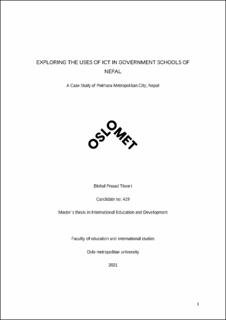Exploring the uses of ICT in government schools of Nepal: A Case Study of Pokhara Metropolitan City, Nepal
Master thesis
Published version
Permanent lenke
https://hdl.handle.net/11250/2977146Utgivelsesdato
2021Metadata
Vis full innførselSamlinger
Sammendrag
As a developing nation, Nepal has acquired a substantial change in financial divisions during the last decade. The craving to be a middle-income nation has driven Nepal to develop a modern approach in education policies that will assist them with producing a skilled workforce and making teaching and learning meaningful. The Government of Nepal has ventured up to make a fruitful usage of ICT in education. The most powerful methods are for spreading information, knowledge, and skills. This study researched the technique of innovation incorporation in the education system as indicated by the new education approach of Nepal. It looks at the extent of ICT use in the classroom, the apparent effect of innovations in education with teaching and learning, and the potential factors that appear to hamper enhanced ICT use in education. Information was gathered from teachers and students by utilizing the method of interviews. The different theories used to analyze and interpret mainly from Zone of Proximal Development by Vygotsky relating to the social constructivism theory and others. Schools begin utilizing innovations in their teaching and learning, but the use isn't ideal primarily since a minor infrastructure and stakeholders' perceptions. ICT made a difference to form the classes student-centred and interactive, which was one of the aims of the new education policy. However, the practice of utilizing innovation in teaching and learning is still constrained in most schools with also highlighting the challenges confronting in use of ICT in government schools of Nepal. Despite this, all the education system stakeholders get the benefits of ICT inclusion, and they are confronting different issues within the implementation process. However, more time is required to overcome these impediments and bring almost behavioural changes among the teachers and pupils to the successful integration of ICT within the education framework of Nepal.
